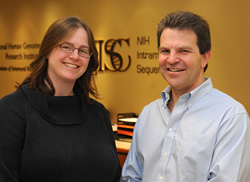Last updated: April 04, 2012
NHGRI Researchers Win AAAS Prize for Neanderthal Genome Analysis
NHGRI Researchers Win AAAS Prize for Neanderthal Genome Analysis
By Raymond MacDougall
NHGRI Staff Writer
 |
NHGRI prize winners James C. Mullikin, Ph.D., acting director of the National Institutes of Health (NIH) Intramural Sequencing Center (NISC), and Nancy F. Hansen, Ph.D., a staff scientist in Dr. Mullikin's research group in NHGRI's Genome Technology Branch, conducted comparative analyses of the modern human versus the Neanderthal DNA sequence. The DNA was derived from bones unearthed in a cave in Croatia and then sequenced at the Max Planck Institute for Evolutionary Anthropology in Leipzig, Germany. The NHGRI researchers are members of the Neanderthal Genome Analysis Consortium that subsequently analyzed this ancient DNA.
"Working with the Neanderthal Genome Analysis Consortium has been an amazing experience, one that puts Homo sapiens' journey in a new light," said Dr. Mullikin. "It's particularly gratifying to be part of a project and article that is recognized with such a prestigious award."
"DNA sequences generated at centers like NISC are leading to scientific advances in many different fields of research," said Dr. Hansen. "I feel lucky to contribute to such an important discovery about our distant evolutionary past."
Neanderthals lived in many parts of Europe and western Asia before disappearing 30,000 years ago. The Science article presented a draft sequence of the Neanderthal genome composed of more than 4 billion nucleotides from the bones of three female Neanderthals who lived some 40,000 years ago in Europe. These sequences were compared to those from five present-day humans from China, France, Papua New Guinea, southern Africa and western Africa. This provided the first genome-wide look at the similarities and differences of the closest evolutionary relative to humans, and maybe even the ability to identify, for the first time, genetic variations that gave rise to modern humans. An analysis of the genetic variation showed that Neanderthal DNA is 99.7 percent identical to present-day human DNA.
The authors showed that Neanderthals shared more genetic variants with present-day humans in Eurasia than with present-day humans in sub-Saharan Africa. This suggests that genes flowed from Neanderthals into the ancestors of non-Africans before the divergence of Eurasian groups. Dr. Mullikin and Dr. Hansen participated in this portion of the data analysis, along with several researchers at the Broad Institute of Harvard and MIT and at Harvard Medical School.
"I am thrilled to congratulate Drs. Mullikin and Hansen on a well-deserved award, which recognizes their particular talents and their capacity to provide the NHGRI intramural program world class DNA analysis," said NHGRI Scientific Director Daniel Kastner, M.D., Ph.D.
AAAS established the Newcomb Cleveland Prize in 1923 with funds donated by Newcomb Cleveland of New York City. The prize is awarded to the author or authors of an outstanding paper published in Science. Each annual contest starts with the first issue of June and ends with the last issue of the following May. Members of the Neanderthal Genome Analysis Project accepted the prize at an awards ceremony on Feb. 19, 2011 during the AAAS annual meeting at the Renaissance Marriott Hotel in Washington, D.C.
For more about the Science article and a video interview with Dr. Mullikin, go to: Complete Neanderthal Genome Sequenced. For more about AAAS and the Newcomb Cleveland Prize see: AAAS Newcomb Cleveland Prize.
